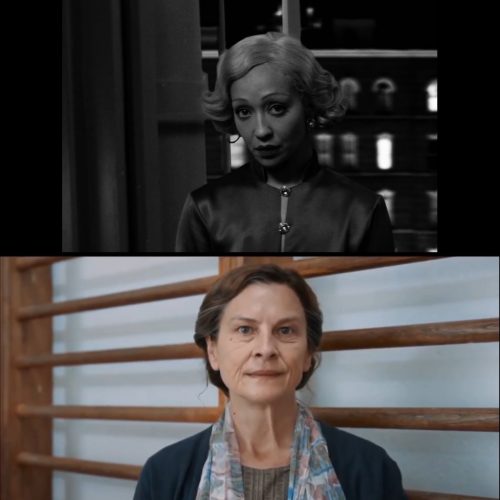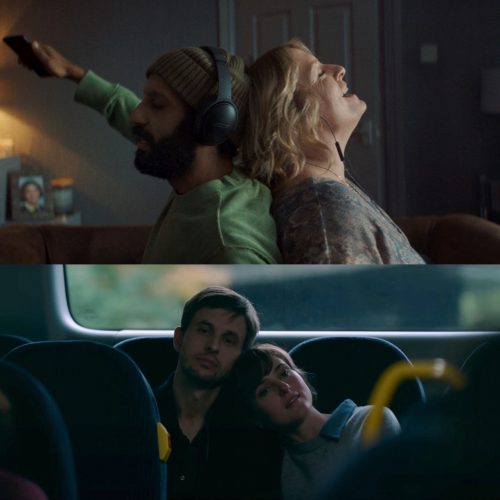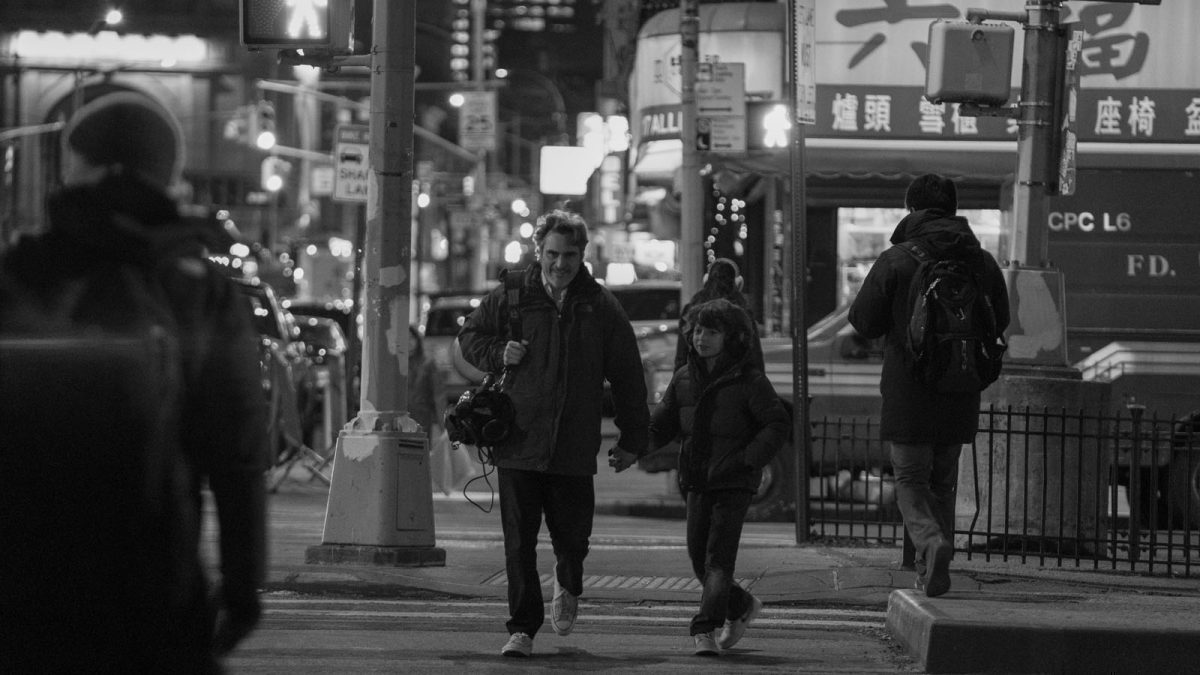My Top 20 films of 2021
1. “C’mon C’mon” (d. Mike Mills)
2. “The French Dispatch” (d. Wes Anderson)
3. “Quo Vadis, Aida?” (d. Jasmila Žbanić)
4. “Passing” (d. Rebecca Hall)
5. “Parallel Mothers” (d. Pedro Almodóvar)
6. “The Hand of God” (d. Paolo Sorrentino)
7. “I’m Your Man” (d. Maria Schrader)
8. “Limbo” (d. Ben Sharrock)
9. “A Hero” (d. Asghar Farhadi)
10. “The Power of the Dog” (d. Jane Campion)
11. “The Worst Person in the World” (d. Joachim Trier)
12. “Ali and Ava” (d. Clio Barnard)
13. “Flee” (d. Jonas Poher Rasmussen)
14. “The Green Knight” (d. David Lowery)
15. “Dune” (d. Denis Villeneuve)
16. “Luzzu” (d. Alex Camilleri)
17. “Costa Brava, Lebanon” (d. Mounia Akl)
18. “The Last Duel” (d. Ridley Scott)
19. “French Exit” (d. Azazel Jacobs)
20. “The Disciple (d. Chaitanya Tamhane)
In thinking about the best of 2021 in film, I found myself self-consciously focusing on the whys of my inclusions and omissions. As if there was some right version of what films I remembered of 2021 should look like. As if movies could bear the responsibility of being the most important things of the year. But, what a burden to ascribe to art. Even the very best of art. As if movies must carry the burden of our lives for us rather than, as they might more effectively, simply reflect the smallness and weirdness of our lives.


In Mike Mills’ “C’mon C’mon”, a radio journalist spends some time with his nephew. The journalist is working on a series of interviews, and allows the child to use the equipment. In a brief moment he offhandedly establishes the value of his audio-recordings: “In a way it’s cool because you get to keep these sounds. You make this mundane thing be immortal, and that’s cool and fun.” Perhaps thinking of movies as a reflection of the mundane might feel like a case of damning with faint praise. In fact, amidst the plethora of handwringing about the end of the cinema experience, movies had had to justify their presence in theatres. Why in a cinema if not for an event? Something that demanded being seen on a giant screen with supersonic sound.
And yet, although in the middle of a pandemic the sanctity of the cinema seems more complicated, the idea of the movies as solely a platform for Great Events feels like such a loss for the form. Engaging with cinema in 2021, I found myself cleaving to the minor keys rather than the major chords. There is a strange comfort in recognising the mundane made specific onscreen. Would it be heretic, though, to say that people are really not that exciting? And that movies find searing value in seeking out how – in the end – we really are very basic, and familiar? And the joy of the movies is in connecting; connecting to what we see, but also making the connections to all that we see. For all their differences, it was finding the connections that made the best films of 2021 resonate.
In two searing looks at masculinity, the Alex Camilleri’s feature-film debut, “Luzzu,” and Asghar Farhadi’s complex ninth-feature, “A Hero,” felt like two of a pair that explored a larger whole. What kind of worlds are there for poor people, and the plight of the father trying to do his best? Whether in Malta, or Iran, the aching sadness felt connected. Farhadi has long been concerned with the implications of one bad decision leading to a symphony of disaster, but the anger in his prickly “A Hero”, where Rahim, a man jailed for debt, tries to do good to no success, felt particularly evocative. In 2021 when the gaps between those who had and those who did not felt so urgent, Rahim’s desperate attempts to do good were matched by the plight of Jesmark in “Luzzu”, a young fisherman from a generation of fishermen trying to earn a living in a dying trade, in a globalised word. In both cases, a lesser film might have hit us on the head with the themes – the precariousness of poverty, the frustrations of foiled dreams, the temporariness of romance – but the gentle “Luzzu” and the more complex “A Hero” were doing something more thoughtful. What struck me watching them both was the gaps of silence they both allowed. We connect to both stories because of the trust the films have in us.
It’s that kind of trust that marked two somewhat more mainstream explorations of masculinity, two more mainstream riffs on familiar genres – Ridley Scott’s “The Last Duel” and David Lowery’s “The Green Knight”. Both films seem to spill out from their subjects, messily, chaotically but also movingly. In Scott’s epic, a fallout between two friends becomes a site of exploring how masculinity leads to the destruction of woman, with Jodie Comer’s central performance doing great work turning the film’s final third into something more devastating that we first expect. For Lowery, his beguiling riff on the 14th Century epic of Sir Gawain had more questions than answers but both were teeming with inquiries of what it means to be noble, a good man, and a hero. And in that way, that connective tissue from Farhadi’s film seemed to emerge. “You are no knight,” a character tells Gawain in the film’s second half. Even he himself has been uncertainly approving and disproving the word as a descriptor. How do you find out who you are? In the film’s final open-ended moment, we do not quite get a resolution. Still, I’ve been thinking about the exactness of Lowery’s ending – knowing exactly when a story needs to end. The unanswered question of who Gawain might be haunts us. But then, who are any of us?
The protagonists of the science-fiction epic “Dune” and the melancholy Marathi-language drama “The Disciple” are both struggling with that question of identity. Because Villeneuve’s film has a sequel, we do not quite get the answer to who Paul, our “hero,” is but that the film feels like a whole on its own is testament to Villeneuve’s power at creating a space for this world that feels more than just aesthetically exact, but emotionally earnest. The worlds might look futuristic, but these feelings – the grief, the uncertainty, the fear, the shame – are all familiar. Growing boys, trying to be men. Like in “The Disciple” where all the passion in the world cannot create real skill or talent for Sharad, the diligent would-be classical musician, the reach exceeds the grasp. “The Disciple” feels like one of the saddest films of the year. How do you accept that you are not special? Is there comfort in being the opposite of a chosen one?
Two cases of refugees making do in hostile environments gave us two of the most thoughtful and engaging explorations of loneliness and isolation and the way perceptions of “difference” create notions of being “chosen”. Ben Sharrock’s humorous “Limbo,” about refugees stuck in Scotland, and seeking asylum in the UK, and the animated “Flee,” about a single man’s story fleeing his home in Afghanistan to be a refugee in Denmark, exist as indelible reminders that films can do so much without hectoring. If “Flee” and “Limbo” follow the previous pair, it is in the way our protagonists keep adjusting and readjusting their identities, trying to create who they might be. Like real people. In real time. But Sharrock is wily. He recognises the nuances that exist beyond the centre, so “Limbo” saves some of its most moving moments for those on the margin, just like “Flee” keeps prevaricating and hiding and shifting refusing to lay bare itself until it can hide no longer. The comedic overtones in “Limbo” or the animation conjured in “Flee” are only illuminating the worries at work here. Both men keep clinging to memories of family that frustrate and buttress their journeys.
It’s the familiar explorations of families, strange and meandering and unwavering that make “French Exit” and “Costa Brava Lebanon” so striking and unusual. The eccentric mother, doting son and father-as-cat figure in “French Exit” feels like a line from a bit. Just like the mother, father, two daughters and grandmother living on a landfill feels like an environmentalist joke in “Costa Brava Lebanon”. Both movies excavate the humour in their scenarios, albeit miles apart in their focus. The former feels like an unrealistic dreamscape, the latter feels too real for words. But they connect across countries, genres and classes to excavate the sad melancholy of trying to make a family out of conflicting units and both are best evoked by their keen understanding of the matriarchs at the centre – Pfeiffer in fine form in “French Exit,” and Nadine Labaki doing excellent work in “Costa Brava Lebanon”. In both films the women find themselves pondering on their places in the world, vis-à-vis their relationships with their families. What is a family anyway?
The question reverberates for Aksel in Joachim Trier’s “The Worst Person in the World,” desperately trying to make one with the younger Julie who is figuring out her life at thirty. That pairing is a different romantic one than the couple in “Ali and Ava”, both divorced and separated by their nationalities rather than just their ages. Both films are remarkable in their romantic explorations for their gentleness and their kindness. Trier’s film finds value in adding a third character, another suitor for Julie, to form a gentle triptych of characters just trying to find lovely in hopeless places. In Clio Barnard’s film, Ali and Ava’s romance is interrupted by children from previous marriages, spouses, and even family members. The romance is not in the easiness of their rapport, but in their individual insistence in not being alone. Don’t we all connect with that?
Early in Jane Campion’s “The Power of the Dog” when a newlywed husband tells his wife, “It’s nice not to be alone”, the line isn’t speaking to any grand statement of specificity. It’s generalness, and its applicability feels apt for everyone in that film. Films always explored the lonely, but in 2021 that loneliness felt more fraught. By the end of “The Power of the Dog” the loneliness still feels pervasive even if a potential threat is excised. But Campion wants us to be haunted by what comes after. It’s the same ellipsis that marks the final frames of Maria Schrader’s excellent “I’m Your Man” where an archaeologist contemplates the possibility of algorithmic love with an AI. Anything to avoid our loneliness, right? But to what end?
In “The Hand of God,” Paolo Sorrentino’s avatar walks through the streets of Naples after a tragedy, loses his virginity and remains aimless. And yet that film is so moving for the way Sorrentino gets the peculiarities of the human spirit. “I want to think about happiness, don’t you?” a character declares. Yes. Because it’s so fleeting. The first joyful half of the film distracts us from the expectant tragedy, based on Sorrentino’s own life. So that the journalists telling stories, eulogising their boss, in Wes Anderson’s “The French Dispatch” keep trying to find some happiness but everything feels bathed in melancholy. Yes, this is Anderson in his wheelhouse but the aesthetic rigour of Anderson’s work has always been a window into human frailty. At the end of the film when one asks, “Is this true?” of a story, the reply is “Sort of.” In that moment we realise the inexactness of veracity anyway. We’re connecting with the feelings rather than the truth. “Sort of” is enough.
And in the depth of that connection, three films found something searing about the women at their centre, not just women but women battling with society and motherhood. “Parallel Mothers” reflects on the bones of the past, while “Passing” recognises how race and gender and sexuality all became ensconced, with a line from a character, “Being a mother is the cruellest thing.” It’s that cruelty that gives “Quo Vadis Aida” its verve, its nerve and its emotion as a woman wrestles with her role as an interpreter in Bosnia as her children become potential targets of genocide. In the wake of all that cruelty we can only return to a face staring out at us and be moved by the naked honesty of the mundane. And so, in “Quo Vadis Aids”, something as mundane as a tear falling down a face as the camera closes in on Jasna Đuričić’s feels like the best of cinema. There is little that is unusual in a tearstained face. But still we connect. Like the women in “The Worst Person in the World” and “Parallel Mothers” taking pictures, as memories, of their loved ones. Or, the journalists in “The French Dispatch” making memories through their words.
I’ve been thinking of various moments in the uncle/nephew duo of “C’mon C’mon” for weeks, although it’s value I think is summed up in the fact that it cannot be whittled down to a plot-point, or even a summary. Yes, this is a film about an estranged uncle reconnecting with his nephew. But it’s also a film about a brother and sister learning to love each other again. It’s a film about healing, but also not healing, from tragedy. It’s a film about the ways that children are clinging desperately to some meaning in a world that feels so random. It is about happiness and it is also about sadness, and it’s moving and explicit because of the way it gently tugs rather than shouts. Moment after moment unspools like a skein, so that everything connects and few things seem to work completely on your own. But isn’t that the beauty of movies? Any movie? Isn’t that kind of fragility a welcome gift? A warm hug? Mills offers no clever solution for our loneliness and malaise; he recognises the worst of our sensibilities in the underlying anger, shame and embarrassment but he also recognises the hope and the possibilities. And that’s the movies. In movies we are possible.
I’m not sure that I learned anything new in the best of the year’s movies. I wasn’t watching them so they could magically make be better, or smarter, or wiser or more informed. I was watching them to be touched, to see human emotion laid bare. I watched them to feel, my own open heart meeting the open hearts, and scars, of these characters and saying, “Yes, this will do.” Isn’t that what movies are for? To connect?







